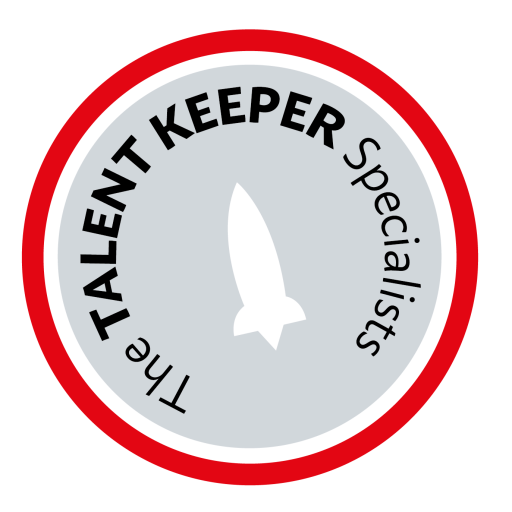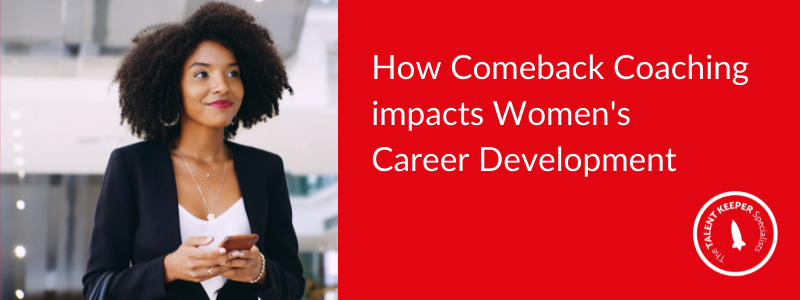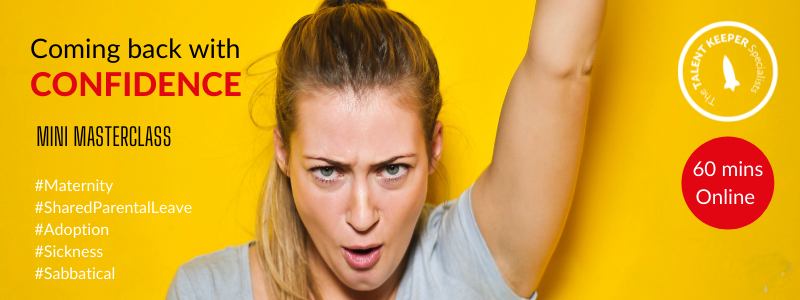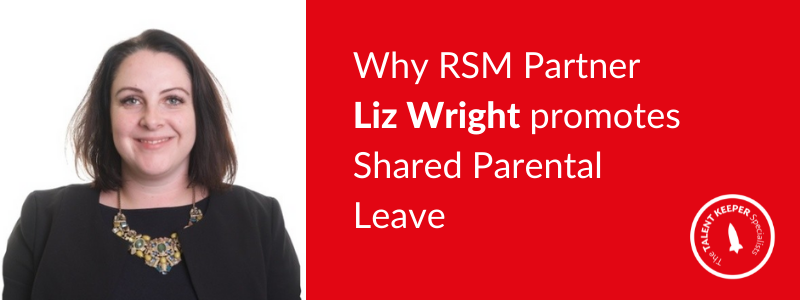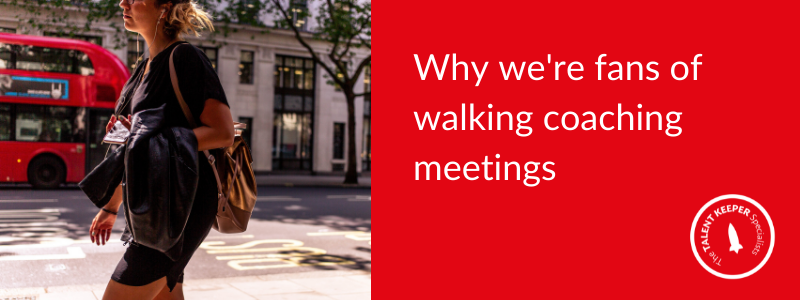It is well documented that having a baby is stressful. Heart-expanding and magical and incredible but also brain-bendingly exhausting too. Until you become a parent – in fact until you become a mother – it’s nigh on impossible to grasp the transformation you will go through.
Overnight, you go from being an independent woman, living your best life, free to pursue your dreams and hobbies, to being a one-woman milk machine, rarely seeing the shower and developing an obsession with sleep that’s borderline worrying.
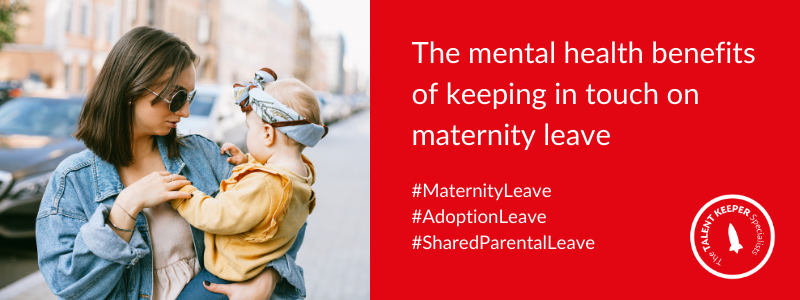
We’re all about supporting people prior to, during and after long leave at The Talent Keeper Specialists, so for this article we’ve dug a little deeper to discover: what is it about maternity leave in particular that is so challenging? How can keeping in touch with work mitigate its effects?
Our research shows the following three things are key to mental wellbeing and they’re things we can keenly miss when we’re away from work:
- Connection
- Stimulation
- Control
While you are utterly absorbed by the demands and needs of your baby, there’s a side of your brain that isn’t being stimulated in the same way that it is used to. Career aspirations, skills and specialities are on hold and for a time, that’s fine. But temporarily losing that sense of making a contribution, or the financial, social or intellectual satisfaction that comes from work, can take its toll. You’re craving control but you don’t know where to find it. At the same time, your core values come sharply into focus.
Why should bosses care about maternal mental health?
If you consider that half the workforce is female, and 80% of these employees are parents or going to become parents, it’s crucially important that we look after them for the relatively short time they are on maternity leave.
The statistics on PND are humbling and relevant to all employers. Postnatal depression affects one in ten mothers. According to a survey by the RCOG, 81% of women in a survey of 2,300 had experienced at least one episode of a mental health problem during or after their pregnancy. Low mood was experienced by more than two thirds of these women, anxiety by around half and depression by just over a third. But with only 7% of the women who reported experiencing a maternal mental health condition being referred to specialist care, it’s clear that employers should be playing a more active role in helping their valued members of staff.
Sybille Raphael, Head of Legal Advice Services at Working Families, also warns that it could be unlawful sex discrimination if employers don’t keep in reasonable contact with the staff on leave. She says that keeping in touch, ideally by telephone rather than email, makes it easier for employees to explain their worries and prepare for their return to work.
You’ll want to be sure you played your part. It could well be the difference between retaining a valued member of staff or losing her.
CONNECTION: How can a boss help their employee on maternity leave?
Reach out. We all know that ‘it takes a village to raise a baby.’ By actively including and communicating with your member of staff during her maternity leave, you’ll be playing your role in keeping her connected and confident. Ensure she is included in both formal and informal office news and updates. She can choose to ignore these, but it’s more likely she’ll be reassured that she is still part of the world of work and know that it is not moving ahead without her. She’ll feel that pull back to her previous life and feel connected. You don’t need to ask her to engage actively, but if she has opened the email, it has been worth it. You will have made that day at home with her baby, a better one.
It’s also so important to recognise that everyone’s experience of motherhood is utterly different. Some will breeze through it with healthy, happy babies and plenty of support. Others will be hit with unpredictable hormonal changes and depression. Others will be raising poorly babies who cry non-stop and never seem to sleep or settle, with no help from family or otherwise. Keeping in touch on a human-to-human level will help you know how and when to support your cherished member of staff.
STIMULATION: The impact of loneliness on new mums
Loneliness creeps up on new mothers. Even though mums are never truly alone (and are probably craving real solitude) long days without adult company can be gruelling. Once the initial flurry of visitors, cards and presents is over and their partner returns to work, the real labour of parenthood begins. Not only are they physically alone, they are emotionally carrying the enormous burden of responsibility for their tiny little bundle.
It can be boring too, churning through the relentless cycle of feeding, changing, napping, interspersed with moments of true joy and utter delight. Even though they adore this little human, it is overwhelmingly dull at times and they will be craving adult conversation. They are likely to feel sad that they are missing out on life with colleagues and friends. It’s also incredibly common to resent their partner for escaping off to the office (even if that is only upstairs at the moment).
This is where KIT days are so valuable. For a new mother to attend a KIT day, she will have had to redress the balance of power at home, and to have trusted another individual to care for her baby. This is huge the first time around. She’ll arrive at work and plunge into her old life for a day. More often than not she will find that to be a relief, a re-engaging process that allows her to remember her professional self and enjoy the intellectual and social stimulation that goes alongside work.
CONTROL: Keeping in touch helps your employee feel less anxious
Robert Jenrick MP, Secretary of State for Housing, Communities and Local Government says that companies must work harder to keep in touch with women on maternity leave. He says that women find it harder to maintain the momentum of their careers on their return to work, especially when male colleagues happily step in and ‘land grab’ the best clients. He made the point that employers wrongfully assume women don’t want to be in touch with projects or clients during their leave. All this adds to the stress load felt by women who fear losing control or status during their absence. By ensuring they have the option to attend key client meetings or performance reviews on KIT days, they’ll maintain their hard-earned status.
What if you have postnatal depression? How do you tell your boss?
Of course, no-one is obliged to share their PND. But if you feel strong enough to do so, it can help. The NCT advises women to keep in touch with their colleagues and boss if they are suffering, to help you feel less anxious about returning to work. PND is so common that it is highly likely your boss will have either first-hand experience of it themselves, or helped others cope with it on their return to work. Most companies have excellent mental health procedures in place; after all, no-one wants to lose great employees.
Returning to work can be a relief
Going back to work really can be a break from the emotional and physical labour that looking after a baby entails. You are afforded the freedom to focus, uninterrupted on an intellectual challenge. You get to talk to your ‘work family’ without the constant background narrative in your mind worrying about the next feed or sleep. You get to progress your career and satisfy that urge to excel. Heck, you even get to drink a cup of coffee without having to reheat it three times!
Supporting employees’ return to work
Executive comeback coaching helps employees identify and address any concerns or issues they have about their return to work. Executive Coaching also helps employees better understand their value and potential to the business and, through a personal action plan, supports their transition back to work. Find out more.
Got a question about supporting colleagues taking maternity leave? E-mail jc@talentkeepers.co.uk or find us on Twitter and Instagram @talentkeepersuk.
